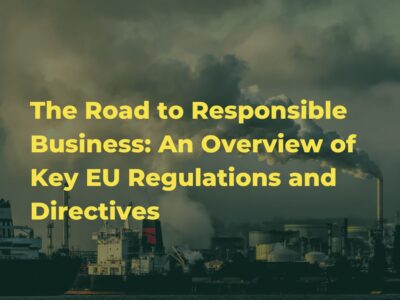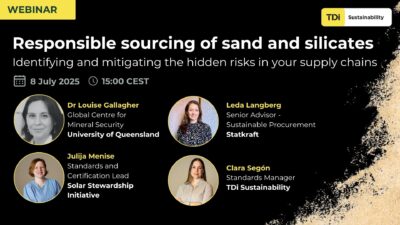
The Road to Responsible Business: An Overview of Key EU Regulations and Directives
The European Union (EU) has been at the forefront of implementing key legislation to address various aspects of corporate sustainability and responsible business conduct such as combating forced labour and addressing deforestation. These actions reflect the EU’s commitment to environmental protection, human rights, and ethical business behaviour.
TDi Sustainability recently conducted a legislation mapping report, utilising insights from our data and our expert team. Below, we have a breakdown of each current and upcoming legislation throughout the European Union.
What it is: The Corporate Sustainability Due Diligence Directive (CSDDD) requires companies to integrate due diligence into policies, identify and mitigate adverse impacts, establish complaints procedures, and publicly communicate on due diligence. It also mandates reporting on sustainability impacts, risks, and actions taken to address them.
Who it affects: Companies with a significant presence in the EU market, including large EU companies and non-EU companies with substantial operations in the EU.
Implementation: The directive is subject to national legislation and is applicable based on company size and global turnover.
Need for regulation: The CSDDD addresses the need for companies to conduct due diligence, report on sustainability impacts, and take proactive measures to mitigate adverse impacts, aligning with the EU’s focus on corporate sustainability and responsible business conduct.
What it is: The Corporate Sustainability Reporting Directive (CSRD) mandates large EU companies and listed companies operating in the EU to publish annual reports on how sustainability matters impact their business and operations’ impact on people and the environment. It requires a “double materiality” assessment and adherence to European Sustainability Reporting Standards (ESRS) with third-party assurance.
Who it affects: Large EU companies and listed companies operating in the EU.
Implementation: Effective since 2023, with phased applicability based on company size and financial thresholds.
Need for regulation: The CSRD was introduced to enhance transparency and accountability in corporate sustainability reporting, ensuring that companies disclose their sustainability impacts and take action to address them.
What it is: This regulation aims to decrease the use of forced labour worldwide by eliminating products made with forced labour from the EU market.
Who it affects: Any economic operator placing or making available products on the EU market or exporting products from the EU market.
Implementation: Proposed in 2024, with a 24-month period before taking effect.
Need for regulation: The regulation addresses the need to combat forced labour and ensure that products entering the EU market are free from forced labour, aligning with the EU’s commitment to human rights and ethical business practices.
What it is: The EU Deforestation Regulation sets mandatory due diligence rules for companies placing certain commodities on the EU market to ensure that only deforestation-free and legal products are allowed. It targets commodities such as coffee, cocoa, cattle, palm oil, soy, rubber, and wood, along with derived products like leather, oil cakes, and chocolate.
Who it affects: The regulation applies to any operator or trader, irrespective of size and industry, placing relevant commodities or products on the EU market or exporting from it.
Implementation: Entered into force in June 2023, with bans on non-compliant commodities effective from December 31, 2024 (or June 30, 2025, for small and medium-sized enterprises).
Need for regulation: The EUDR addresses the need to combat deforestation, protect global biodiversity, and reduce greenhouse gas emissions by ensuring that products placed on the EU market are deforestation-free and legally sourced, aligning with the EU’s commitment to environmental sustainability and responsible sourcing practices.
What it is: The Responsible and Sustainable International Business Conduct Act proposed in the Netherlands aims to mitigate human rights risks, including environmental risks, that can lead to human rights violations in global supply chains. It outlines key requirements for entities with known activities that have adverse human rights or environmental impact, including GHG emission tracking, adverse media reporting, supply chain mapping, remediation plan, external reporting, product mapping, third-party assurance, supplier/risk monitoring, supplier engagement, supplier training, ESG risk analysis, supplier assessments, supplier corrective action plan, and Xinjiang/WRO mapping.
Who it affects: The Act applies to Dutch or other EU entities engaging in activities outside the Netherlands, non-EU entities engaged in activities or marketing products in the Netherlands, and large entities under the EU Accounting Directive.
Implementation: Proposed in 2022, the Act is expected to enter into force with effect from July 1, 2024, phasing in over a twelve-month period.
Need for regulation: The Act addresses the need to ensure responsible and sustainable international business conduct, prevent adverse human rights and environmental impacts, and promote ethical and sustainable practices in global supply chains, aligning with the Netherlands’ commitment to human rights, environmental protection, and ethical business conduct.
Duty of Vigilance Law – Belgium (Proposed)
What it is: The proposed Duty of Vigilance Law (Doc 55 1903/001) (the “Act”) in Belgium aims to require companies to monitor the corporate social responsibility of their value chains and provide additional legal claims for adverse impacts.
Who it affects: The Act would apply to all companies established or active in Belgium, with large enterprises and those operating in high-risk sectors or regions having greater obligations.
Implementation: The draft Act was approved by the Belgian Chamber of Representatives on April 22, 2021, and is expected to enter into effect six months after its publication in the Moniteur Belge.
Need for regulation: The Act addresses the need to monitor corporate social responsibility in value chains, mitigate adverse impacts, and provide legal claims for affected parties, aligning with Belgium’s commitment to responsible business conduct and sustainability.
What it is: The Due Diligence in the Supply Chain Act in Germany, also known as the Lieferkettengesetz, aims to promote responsible business conduct by requiring companies to conduct due diligence in their supply chains to prevent human rights violations and environmental damage.
Who it affects: The Act applies to large companies in Germany with more than 3,000 employees, targeting businesses with significant operations and supply chain activities.
Implementation: The Act came into effect on January 1, 2023, with a transition period for compliance until 2024.
Need for regulation: The Act addresses the need to ensure responsible business conduct, prevent human rights violations and environmental damage in supply chains, and promote ethical and sustainable practices, aligning with Germany’s commitment to corporate social responsibility and sustainability.
Speak to the Experts
The EU’s legislative focus on corporate sustainability and responsible business conduct underscores the importance of aligning business operations with ethical and sustainable practices. With the right guidance and expertise from organisations like TDi, businesses can effectively navigate the evolving regulatory landscape, meet compliance requirements, and contribute to a more sustainable and responsible business environment within the EU.
TDi’s expertise in sustainability consulting, due diligence guidance, and compliance analyses can help your company navigate the complexities of EU legislation, implement necessary measures, and report on sustainability impacts effectively. By partnering with us, businesses can proactively address regulatory challenges, mitigate risks, and demonstrate a commitment to responsible business practices. Get in touch if you would like to find out how.
 supply chain
supply chain
Re-defining legacy | Supporting companies and investors in achieving positive legacies in mining operations
3rd July 2025 supply chain
supply chain
Responsible sourcing of sand and silicates | Identifying and mitigating the hidden risk in your supply chains
24th June 2025 supply chain
supply chain
